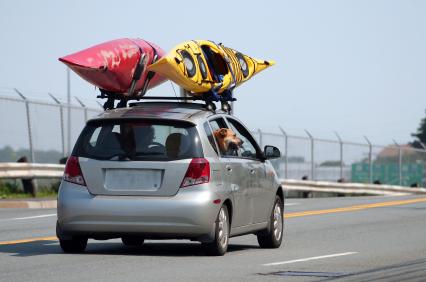
In 2010, Americans traveled a total of 3 trillion miles -- the equivalent of 6.5 million round-trips to the moon.
Transportation accounts for 72% of U.S. oil use, mostly for gas. Luckily, there are plenty of ways to improve your gas mileage or avoid using gas altogether.
Driving Tips*
- Avoid idling. Think about it -- idling gets you 0 miles per gallon. The best way to warm up a vehicle is to drive it. No more than 30 seconds of idling on winter days is needed. Anything more simply wastes fuel and increases emissions.
- Avoid aggressive driving, such as speeding, rapid acceleration, and hard braking, which can lower your highway gas mileage by up to 33% and your city mileage by 5%.
- Avoid high speeds. Above 60 mph, gas mileage drops rapidly. For every 5 mph above 60 mph, it's like paying an additional $0.30 per gallon of gasoline.
- Avoid keeping heavy items in your car; an extra 100 pounds in your vehicle could increase your gas costs by up to $.08 cents per gallon.
- Reduce drag by placing items inside the car or trunk rather than on roof racks, which can decrease your fuel economy by 5% or more.
- Combine errands. Several short trips, each one taken from a cold start, can use twice as much fuel as one trip covering the same distance when the engine is warm.
- Check into telecommuting, carpooling, and public transit to save driving and car maintenance costs. Many urban areas provide carpool lanes that are usually less congested, which means you will get to work and home faster and more refreshed!
*All cost estimates assume an average price of $3.96 per gallon. Source: fueleconomy.gov
Car Maintenance Tips
- Use the grade of motor oil your car's manufacturer recommends. Using a different motor oil can lower your gas mileage by 1%-2%.
- Inflate your tires to the pressure listed in your owner's manual or on a sticker in the glove box or driver's side door jamb. This number may differ from the maximum pressure listed on your tire's sidewall.
- Get regular maintenance checks to avoid fuel economy problems due to worn spark plugs, dragging brakes, sagging belts, low transmission fluid, or transmission problems.
- Don't ignore the check-engine light -- it can alert you to problems that affect fuel economy as well as more serious problems, even when your vehicle seems to be running fine.
- Replace clogged air filters on an older car with a carbureted engine to improve gas mileage by as much as 10% and to protect your engine.
Long-Term Savings Tips

- Choose vehicles according to your need. For example, if you mostly drive in cities, a smaller hybrid might be right for you because they get better mileage in city driving and are easier to park.
- If you need a vehicle for towing or heavy use, consider a clean diesel vehicle. Diesel engines are quieter, more powerful, and 30%-35% more efficient than similar-sized gasoline engines. The new generation of clean diesel vehicles must meet the same emissions standards as gasoline vehicles.
- Many vehicles produced by U.S. auto manufacturers are flexible fuel vehicles (FFVs), which can run on E85 (85% ethanol, 15% gasoline) and other ethanol-gasoline blends. Check your owner's manual to find out if your vehicle is an FFV.
- Consider buying a highly fuel-efficient vehicle. A fuel-efficient, plug-in electric (PHEV), hybrid, or alternative fuel vehicle could cut your fuel costs and help the environment. See the Fuel Economy Guide for more information on buying a new fuel-efficient car or truck.
- Also, if you have a plug-in hybrid electric or an all-electric vehicle, charging stations for electric vehicles are increasingly available throughout the country. Similarly, you can find alternative fuel stations -- such as those that offer E85 -- and charging sites by visiting the Alternative Fueling Station Locator.
